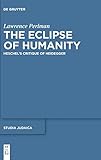The Eclipse of Humanity : Heschel’s Critique of Heidegger / Lawrence Perlman.
Material type: TextSeries: Studia Judaica : Forschungen zur Wissenschaft des Judentums ; 91Publisher: Berlin ; Boston : De Gruyter, [2016]Copyright date: ©2016Description: 1 online resource (XIV, 205 p.)Content type:
TextSeries: Studia Judaica : Forschungen zur Wissenschaft des Judentums ; 91Publisher: Berlin ; Boston : De Gruyter, [2016]Copyright date: ©2016Description: 1 online resource (XIV, 205 p.)Content type: - 9783110441888
- 9783110434187
- 9783110435443
- 193 23
- online - DeGruyter
- Issued also in print.
| Item type | Current library | Call number | URL | Status | Notes | Barcode | |
|---|---|---|---|---|---|---|---|
 eBook
eBook
|
Biblioteca "Angelicum" Pont. Univ. S.Tommaso d'Aquino Nuvola online | online - DeGruyter (Browse shelf(Opens below)) | Online access | Not for loan (Accesso limitato) | Accesso per gli utenti autorizzati / Access for authorized users | (dgr)9783110435443 |
Frontmatter -- Acknowledgments -- Overview -- Introduction -- 1. Are Philosophy and Religion Possible after Auschwitz and Hiroshima? -- 2. Amidst the Traditions -- 3. First Phenomenology – in the Cobbler’s Workshop -- 4. Dasein and Adam -- 5. The Eclipse of Humanity -- 6. Heschel and the Postmodernists: (Are the Demonic and Death Real?) -- Bibliography -- Index of Names -- Subject Index
restricted access online access with authorization star
http://purl.org/coar/access_right/c_16ec
It has been widely assumed that Heschel's writings are poetic inspirations devoid of philosophical analysis and unresponsive to the evil of the Holocaust. Who Is Man? (1965) contains a detailed phenomenological analyis of man and being which is directed at the main work of Martin Heidegger found primarily in Being and Time (1927) and Letter on Humanism (1946). When the analysis of Who Is Man? is unapacked in the light of these associations it is clear that Heschel rejected poetry and metaphor as a means of theological elucidation, that he offered a profound examination of the Holocaust and that the major thrust of his thinking eschews Heidegerrian deconstruction and the postmodernism that ensued in its phenomenological wake. Who Is Man? contains direct and indirect criticisms of Heidegger's notions of 'Dasein', 'thrownness', 'facticity' and 'submission' to name a few essential Heideggerian concepts. In using his ontological connective method in opposition to Heidegger's 'ontological difference', Heschel makes the argument that the biblical notion of Adam as a being open to transcendence stands in oppostion to the philosophical tradition from Parmenides to Heidegger and is the only basis for a redemptive view of humanity.
Issued also in print.
Mode of access: Internet via World Wide Web.
In English.
Description based on online resource; title from PDF title page (publisher's Web site, viewed 28. Feb 2023)


